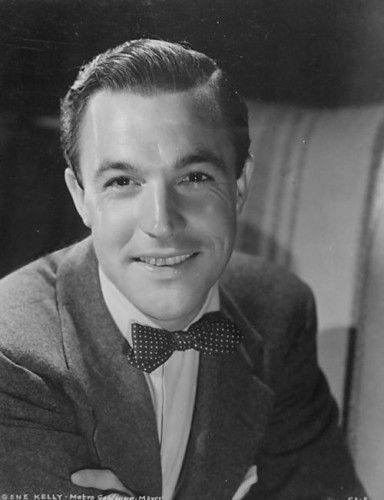
DePaul media studies professor Kelli Marshall is a die-hard Gene Kelly fan. She has authored seven articles dedicated to the classic American actor and she built a fansite to share anything and everything Kelly-related. But her latest academic work published by a university press was just put on hold by none other than Gene Kelly’s widow, who is suing over copyright.
Gene Kelly, the lovable actor who sang in the rain and fell in love as an American in Paris, is a symbol of the golden era of musical television. After his death in 1996, his third wife, Patricia Ward Kelly, was named executrix of his estate and has “devoted her adult life and career to promoting and protecting all aspects of Gene Kelly’s legacy by writing, directing and performing works.”
But according to Marshall, Kelly isn’t the only one dedicated to preserving the actor’s legacy.
Marshall started a website in 2010 to collect all things Gene Kelly and in February wrote, “Initially my goal was to gather together all of the Gene Kelly-related news, videos, commentary, photographs, GIFs, tweets, and tributes… eventually my scholarly project evolved into a fully functioning fan site with multiple (unpaid) contributors, recurring series, lengthy essays, and accompanying social-media accounts.”
The site reached hundreds of thousands of fans and has a significant following on social media. Marshall said her academic fandom “contributes positively” to her writing and her course about Kelly at the Facets Film School in Chicago.
“What’s not exciting about visiting with people who literally hold in their hands the clothes of a classical Hollywood star? Or who visited his Beverly Hills home? Curating a Gene Kelly fan site is not at all a bad way to spend one’s free time outside of the classroom,” Marshall wrote.
But for Marshall and the University Press of Mississippi (UPM), rights to everything Gene Kelly said or sang now has to be fought over in court.
Kelly filed the lawsuit April 29 after receiving a series of Facebook messages from Marshall on March 29, 2016, asking for permission to use interviews between Gene Kelly and the BBC for a volume published by UPM titled “Gene Kelly: Interviews, part of “Conversations with Filmmakers.”

The same day, Kelly responded that all interviews belonged to her and that Marshall must obtain permission. After receiving more messages from Marshall, Kelly sent an official cease and desist letter to Marshall and UPM March 31 demanding the book be discontinued.
That day UPM responded they would go ahead with the book.
“The University Press of Mississippi’s interviews and conversations titles are a long-running series of books that highlight filmmakers, writers, comics artists, and other notable public figures,” Clint Kimberling, publicity and advertising manager for UPM said in an email. “These books routinely make use of previously published, nonfiction works and provide an accessible volume of nonfiction research for both scholars and general readers alike.
“UPM and its volume editors secure all rights for the content contained within these titles from third-party rights holders for the purpose of creating a new nonfiction work.”
Marshall said she could not comment in detail on the case as it was still in litigation, but “in accordance with the University of Mississippi Press guidelines, I have been seeking all permissions necessary to reproduce copyrighted material that is the property of others, and I will rigorously defend myself and my book-in-progress on Gene Kelly.”
DePaul law professor Michael Grynberg said issues of copyright fall under intellectual property law, which can make it difficult to define when something belongs to someone, especially when that something isn’t tangible like land or personal property.
“Copyright is a protection over original works of authorship that are fixed in a tangible medium of expression,” Grynberg said. “But basically it’s protection for expressive works of authorship like a song or a novel or a movie. The beholder of the copyright has the ability to stop other people from, in certain circumstances, from making reproductions of that work.”
In the case between Marshall, UPM and Kelly, it comes down to who has the right to use the interviews conducted by BBC.
“With an interview there can be a question of whether the interviewee could be seen as the author of the resulting interview,” Grynberg said. The other case scenario, in which Marshall and UPM would benefit, is that the BBC has the right to give permission because of how the interview conducted, such as if it was filmed or recorded.
These are just some of the variables involved in determining the rights to these interviews, but what Grynberg knows for sure is that litigation “can go on forever.”
In the meantime, Kelly claims that by using her husband’s interviews, the book, due to be published in 2017 according to Marshall’s website, will “cause great and irreparable injury that cannot fully be compensated or measured in money.”

